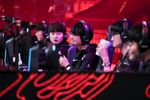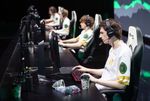Rekkles, Bjergsen, Faker, Caps and Doublelift are reputable players in the League of Legends Scene. They have achieved what many can only dream of, because they have made playing video games a profession. They play LoL for professional teams and earn their livelihood with that for years.
League of Legends is one of the largest disciplines in esports, and there has long been a princely "minimum wage" for the professionals of the top leagues. But not every esports title has the resources to support their pros so well. Not to mention that only the very best of them can benefit. If one browses through the forums of the games, one gets the impression that there are mostly pros out there. But one look at the rankings is enough to see that only a very few are actually that good at getting close to professionals. And those who can live well on being a professional are less than the best 0.01%.
Social media, Twitch.tv and the classic media often distort the image of professionals, because you only see those who have already established themselves, but not the many, many who tried, but failed. Amateurs often give up a solid foundation in their youth to pursue their big dream. If this bursts then they are often left with nothing and it is necessary to continue with their normal lifes.
The everyday monotony
But suppose one is indeed one of those exceptional talents who have made the decisive step. Solid team, if you are lucky also a solid income. Playing video games is no longer a pastime, but hard work. And a plenty of it: Often the professionals play twelve hours a day, whether you feel like it or not. This not only harms the physique, but also the psyche (If you do not counteract). Day in, day out the same game, every week, every month. This is as monotonous as it sounds, because it does not leave much time for leisure.
Sure, meanwhile, the big teams pay attention to the health of their players, but the rule for the majority of professionals is far from that. The players usually live in their gaming house, where the whole team is together. Often they can only visit their families on a few occasions, such as Christmas, especially when they play in a completely different country.
Constant survival struggle
The environment of an esports professional changes rapidly. Players often have short contracts, so it happens that team members are replaced after a year or less, especially when the performance is not as expected. The developers of esports titles regularly patch their games, so the players have to adapt again and again. This is anything but fun for the teams, since the existance for the whole brand depends on prize money. Esports teams live off their sponsors and are therefore very much in social media in the public domain. Not all players are up to this kind of publicity. Anyone at YouTube, Twitter, and Co can easily share their opinion of players' achievements, and it's often not exactly sweet talk. If the success does not come, the careers of individual players are quickly terminated prematurely and you hear nothing more of them.
Dependence on the publisher
While football has a large association structure, esports is usually where the publisher carries out the big tournaments themselves. This has recently led to the professionals of the Moba Heroes of the Storm simply abandoning their jobs. After the expected hype surrounding the Blizzard Moba failed, the American c0mpany drove back the support for the game. Their specially introduced professional league system was pulped. Suddenly, the pros had to find another way to continue making money. Many of them went over to League of Legends, but this is not immediately successful. In the end, these athletes are exposed to the arbitrariness of the publisher. They alone decide, what the rules for the game are, who gets sanctioned, what the patches look like, or whether the competition is still taking place. That makes esports of course totally fragile.
After the career, it is often difficult to get back to normal life again. Many try streaming to earn their money, as a gamecaster, or work behind the scenes of an esports team. While it may appear that being a professional gamer is a desirable profession, one should always keep in mind how few actually make it and whether you really want to have a 70-80-hour week in which there is not much, except the game.











If you press this button it will load Disqus-Comments. More on Disqus Privacy: Link